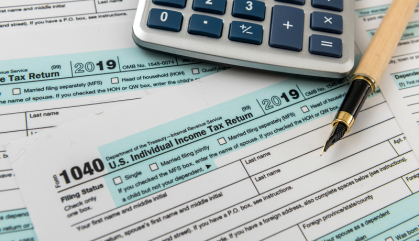How COVID Might Impact Your Taxes This Year

It’s that time of year again. As New Jersey residents race to file their 2021 tax returns over the next few weeks, many may be left wondering how COVID stimulus payments, unemployment benefits and child tax credit changes impact their returns.
We spoke with Jay Soled, a professor and director of the master of accountancy in taxation program at Rutgers Business School–Newark and New Brunswick, to find out what New Jersey taxpayers can expect this year.
How will the COVID stimulus checks I received in January and March of 2021 impact my tax returns?
COVID payments are not taxable income. Accordingly, they will not affect taxpayers’ adjusted taxable income or any other tax return-related item.
I’m filing my tax return myself using software. Is there anything I can do to make the process easier?
For the first time, Turbo Tax and other software providers allow taxpayers to scan their tax information returns (e.g., Forms 1099 and W-2), and the programs will then populate tax returns with this information. This makes it a lot easier on you.
I received unemployment benefits as well as Federal Pandemic Unemployment Compensation (FPUC) funds in 2021. Will I be taxed on FPUC funds? If so, what can I expect that I will owe? Should I consider itemizing deductions instead of taking the standard deduction to offset the extra payments?
Yes, unemployment payments received in 2021 are taxable. The amount you owe will depend upon your adjusted gross income and your corresponding effective tax rate. If your itemized deductions exceed the standard deduction, you should itemize deductions to minimize your tax burden. Otherwise, take the standard deduction.
You suggest that the federal government should start asking people how much in business-related payments they received through Venmo or PayPal or checks made out to “cash” last year. Why?
The IRS does not currently ask you to report how much business-related cash or cash equivalents (such as cryptocurrency) that you received through services like Venmo; however, raising questions related to cash payments on the face of tax returns would enable the IRS to determine whether taxpayers are paying their fair share. As a result, the agency could potentially collect billions more in tax revenue without raising taxes.
Keep in mind that we’re talking about business-related income, and not money received, for example, from a friend transferring money to you through Venmo to pay you back for dinner.
How do I know whether I received the full allotment of my Advance Child Tax Credit before the program ended? If I did not, how can I claim the rest? How will those advance payments impact my tax returns?
Advance payments of up to half the 2021 Child Tax Credit were sent to eligible taxpayers under the American Rescue Plan. For the 2021 tax year, the child tax credit increased from $2,000 per qualifying child to $3,600 for children ages 5 and under at the end of 2021 and $3,000 for children ages 6 through 17 at the end of 2021. The disbursement of Advance Child Tax Credit payments began in July and continued on a monthly basis through December 2021, generally based on the information contained in your 2019 or 2020 federal income tax returns.
If you were eligible for the child tax credit, but did not receive Advance Child Tax Credit payments, you can still claim the full credit amount when you file your 2021 tax return during the 2022 tax filing season.